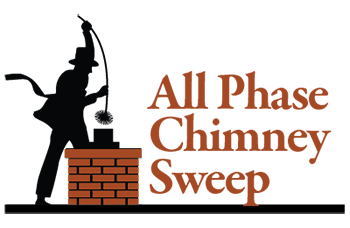
Serving
Buncombe, Hendersonville, Haywood,
Yancey, Madison, McDowell, Rutherford
Counties in Western NC
Since 2005

Chimney Sweep
Fireplace Scans & Cleaning
Problem Solving
When an issue emerges within your chimney system, it demands the keen observation and intuitive skills of experts to pinpoint the root cause and rectify it. Our skilled technicians have encountered a myriad of chimney-related problems, encompassing a vast range of possibilities. If you encounter a challenge, we stand ready to provide assistance.
Dealing with Smoke in Chimneys
The occurrence of smoke within a chimney can arise from both simple factors (such as user oversight) and more complex ones. Our technicians possess the capability to diagnose the source of the smoking issue and implement the necessary measures to eliminate it.
Chimney Scans & Inspections
All Phase offers chimney scans, a real-time video inspection of a chimney’s interior using a high-resolution camera. It provides a detailed view of the flue, smoke chamber, and liner to detect hidden issues like cracks, blockages, or deteriorated masonry that a visual inspection might miss. This allows for accurate identification of problems such as damage, obstructions, and buildup, enabling professionals to recommend precise repairs or cleaning.
The National Fire Protection Association 211 Inspection Standards has established the Chimneys, Fireplaces, Vents and Solid Fuel-burning Appliances Code, 2016 (NFPA 211, 2016) which provides the foundation for many state and city codes. The NFPA 211, 2016 combined with local jurisdiction amendments form the state codes. The full document can be accessed here. All Phase Chimney adheres to these standards.
Level 1:
1) Annual inspection.
2) During routine cleaning of the chimney flue.
3) At the time of replacement of one or more connected appliances with an equal number of appliances of similar type, input rating, and efficiency.
Level 2:
1) Addition or removal of one or more connected appliances, or upon replacement of an appliance with one or more dissimilar type, input rating, or efficiency.
2) Prior to relining of a flue or replacement of flue lining.
3) Upon a sale or transfer of the property.
4) After a building or chimney fire, weather or seismic event, or other incident likely to have caused damage to the chimney.
Level 3:
1) Where necessary for the investigation of a building or chimney fire, weather or seismic event, or other incident known to have caused damage to the chimney or building.
2) Where a hazard detected or suspected as the result of a Level I or II inspection cannot be fully evaluated without access to concealed areas.
Chimney Cleaning
In addition to chimney inspections, chimney sweeping stands is a vital component of your yearly maintenance routine. Whenever the time comes for your annual sweeping, simply get in touch with us. We will diligently perform a meticulous cleaning with a Level 1 inspection.
Chimney Leakage
Experiencing water infiltration into your chimney system? Don't hesitate to reach out to us! We will identify the root causes of the issue and repair your chimney. Among solutions is the application of a breathable waterproof sealant which can substantially prolong the durability of your masonry, effectively preventing troublesome chimney leaks from occurring.
Flue Relining
The flue liner in your fireplace or stove holds a crucial role in ensuring safe functionality. If your liner is compromised or if your older chimney lacks one altogether, don't hesitate to contact us. We're equipped to provide the installation of a high-quality new liner that guarantees years of secure and efficient enjoyment.
Chimney Cap & Damper Installation
Chimney caps and dampers assume vital functions within your system, ranging from safeguarding against water intrusion to enhancing energy efficiency. Should your cap or damper be in disrepair and necessitate replacement, our skilled technicians are ready to suggest top-notch solutions and conduct expert installations for your peace of mind.

FAQs
What is a chimney scan?
A chimney scan is a professional, real-time video inspection of a chimney’s interior using a high-resolution camera. It provides a detailed view of the flue, smoke chamber, and liner to detect hidden issues like cracks, blockages, or deteriorated masonry that a visual inspection might miss. This allows for accurate identification of problems such as damage, obstructions, and buildup, enabling professionals to recommend precise repairs or cleaning.What a chimney scan reveals:
- Structural damage: Cracks in flue tiles or masonry, separated joints, and voids in the smoke chamber.
- Blockages: Obstructions like creosote buildup, animal nests, or debris that impede proper drafting.
- Deterioration: Water damage, rusted liners, and damage from chimney fires.
- Thorough inspection: A camera provides a 360-degree view of areas that are impossible to see with a flashlight, especially around bends and curves.
- Accuracy: It provides visual, documented proof of damage or issues, eliminating guesswork and enabling accurate quotes for repairs.
- Preventative maintenance: It helps homeowners catch small problems early, preventing them from becoming more expensive and dangerous issues later.
- Insurance claims: A video scan is crucial documentation for submitting an insurance claim after a chimney fire or natural disaster.
- Annually: The National Fire Protection Association recommends a professional inspection and scan annually, especially if you use your fireplace regularly.
- Before a purchase: When buying or selling a property to ensure the chimney is safe.
- After an event: Following a chimney fire or severe weather event.
- When issues arise: If you notice changes in performance, such as poor drafting.
Can my chimney catch fire?
Chimneys are susceptible to fires, unfortunately, a widely encountered issue. Each year, more than 25,000 chimney fires transpire, resulting in substantial damage to homes that amounts to hundreds of thousands of dollars. These incidents not only jeopardize the chimney system but also pose a threat to the entire house. They underscore the crucial significance of treating chimney maintenance with utmost seriousness. These fires typically originate from the accumulation of creosote or the ignition of debris within the flue. Factors such as restricted airflow, improperly seasoned firewood, and cooler temperatures within the system contribute to the formation of creosote buildup.When is the best time to have my chimney cleaned?
Spring is the best time of year to have your chimney services done. Once autum arrives, most chimney business are very backed up. Also, you should have your chimney serviced directly after the winter months of heavy usage so dangerous creosote does not sit in your chimney for an extended period of time.Get a discount for Early Spring Cleanings!
Do I need a chimney cap?
A chimney cap protects your chimney from any debris or wildlife entering your chimney. It protects your chimney from nesting or deposits of leaves and other flammable material.Does my chimney need a liner?
NFPA enforces that chimneys must have a liner that is able to contain the materials of combustion. Remember that you may have a liner but if it is not in good shape it is basically useless. Have your chimney inspected today.How often should a chimney be cleaned?
Your chimney should be cleaned and inspected at least once a year according to the Chimney Safety Institute of America (CSIA) and other veteran professionals. It should also always be swept when any amount of glazed creosote is present. Spring is a great time to check your chimney!See our Early Bird coupon for 10% savings for April, May, June & July appointments.